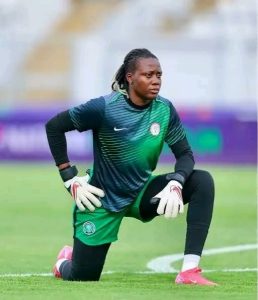By Yisau Babatunde

In a small corner of Orlu, Imo State, Nigeria, a teenage girl once stood barefoot on a dusty pitch, her hands covered in sand instead of gloves. Each time the ball slipped past her, her friends laughed, but she never stopped. Every failed dive encouraged her to try again.
That girl was Chiamaka Cynthia Nnadozie, who would one day become one of Africa’s most admired goalkeepers. But back then, she was simply Chiamaka from Umualunaku, the daughter of a tailor and a former footballer whose own dream had faded too soon.
Her father, once a passionate player himself, knew the pain of disappointment. When he saw his daughter spending long hours playing football in the neighborhood, he worried she was throwing her future away. “I told her football is not for women,” her father recalled in an interview with BBC Igbo in 2019. “She would sneak out, sometimes return home bruised. I didn’t like it. But, she never stopped.”
Her mother, a quiet woman who understood her daughter’s stubborn light, secretly gave her support by giving her transport fare to attend training sessions and cover her when her father complained.
“My Mother was my first fan, she protected me when others said I was being stubborn. Without her, I wouldn’t be here,” Ciamaka told CAF Online in 2024.

Playing Among Boys, Dreaming Among Men
Chiamaka’s journey began with rejection. At school, she was often told that football was “not ladylike.” Even her peers mocked her rough style of play. But she found her confidence not among girls, but among boys who challenged her to be stronger.
“I was always the only girl among them,” she once explained in an interview with Soccernet Nigeria. “They didn’t go easy on me. They hit the ball hard. They played rough. That’s how I became fearless.”
That toughness later defined her style; commanding, daring and vocal. In 2016, scouts from Port Harcourt based women’s club, Rivers Angels, spotted her raw talent during a youth match. She was just 16. Three years later, she was starting for the Super Falcons of Nigeria.
Paris Lights: A Rise to Global Stage
On June 12, 2019, in Grenoble, France, the 18-year-old Chiamaka Nnadozie stepped onto the world stage at the FIFA Women’s World Cup. Calm and untested, she started in goal against South Korea, and kept a clean sheet. It was a historic moment as she became the youngest goalkeeper ever to record a clean sheet in the tournament’s history.
The World took notice. Commentators praised her agility and composure. Nigerians flooded social media with her photos, calling her “The Wall of Paris.”
But behind the cheers was a young girl quietly battling her own solitude, her success came at a personal cost.
“After every match, I cried, not because I was sad but because I wished my mother could see me live,” she said in an interview with Punch Sport Extra.
Her mother couldn’t afford the flight to France. As the stadium lights faded, Chiamaka stood tall, proud, but alone.Her heart was full of happiness but seemed heavy.
In 2020, she joined Paris FC, one of Europe’s top women’s clubs. To many, it looked like a dream fulfilled, new city, new contract and global spotlight. But, behind the huge success, a quiet storm brewed.
“There were days I didn’t want to leave my bed. I missed home food, my church, even the noise in my street,” she admitted to Pulse Sports.
Life in Paris was not easy. She struggled with the language barriers, the weather and the loneliness of being away from her close knit family. Though she adapted through often video calls from family, worship songs from her phone and her determination to “never disappoint Nigeria.”
That perseverance paid off. In 2023 and 2024, Chiamaka Nnadozie was named the CAF Women’s Goalkeeper Of The Year, back to back—a feat no Nigerian woman had achieved before.
The Brighton Chapter
When Chiamaka joined Brighton & Hove Albion in England’s Women’s Super League in 2025, fans celebrated it as another milestone. Yet, again, the early days were hard. “Everyday I cry because I feel lonely. I missed my family, my teammates and my coaches from Paris,” she confessed to Sure FM in October 2025.
Her admission was rare in African sport circles, where athletes are often expected to show only strength. But, Chiamaka’s vulnerability struck a chord and opened conversation about mental health in women’s football, a topic often overlooked.
Ciamaka knows the weight she carries, the expectations on her were so high, for Nigeria, for African women’s football, from every young goalkeeper who sees hope in her story. Balancing all that with her humanity has become part of her journey.
At Brighton, she continues to shine, making crucial saves, inspiring chants from fans, and mentoring younger players. But when training ends and messages from home go silent, she still feels the ache of distance.
“Sometimes, I imagine I’m back home in Orlu. I close my eyes and hear my mother calling me in the kitchen. Every tear reminds me I’m alive. Every save reminds me why I’m here,” she said during a 2025 team podcast.
The Bigger Picture: Gender And Unwritten Future
Chiamaka’s story mirrors the larger fight for gender recognition in African sports. For decades, Nigerian female footballers struggled for fair pay, visibility, good treatment and respect. Despite the Super Falcons’ dominance in Africa, they earn far less than their male counterparts.
Sports journalist Fisayo Dairo in 2024 BBC Africa Panel, notes that Chiamaka represents a new wave, and a bridge between two worlds, where passion meets professionalism.
“She is not just playing football; she is rewriting what it means to be a woman athlete from Africa. Her leadership, her courage to speak about mental health, that’s revolutionary.”
Dr. Tunde Omoleye, a sport analyst during one of his podcasts in 2025 said that what Chiamaka feels is not uncommon.
“Athletes, especially young African players abroad, deal with emotional displacement,” he explained. “They move from a community of belonging to countries where they were outsiders. The transition can be psychologically heavy.”
He added that football agencies and national federations often focus on performance, not the person.
“We celebrate their trophies but ignore their tears. What Chiamaka voiced is the reality many faced silently,” he said.
Similarly, Grace Okon, a former Super Falcons player turned coach, agrees. “When I played in Finland, I cried too. You feel invincible sometimes. I am proud of Chiamaka for being honest. It makes her human. Her story shows us we still have a long way to go.”
The Goal Beyond Goals
At just 24, Chiamaka Nnadozie’s story is far from over. Her gloves carry not just dreams but also the weight of expectations; from fans, from nation, from little girls who see in her reflection of what is possible.
Back home, she’s paying it forward through her ‘SaveHerGoal’ Foundation, which provides school kits for girls and encourages them to stay in school while pursuing sports careers.
“I want girls to know they can be strong, holy, and successful,” she told CAF Media in August 2025.
If greatness has a cost, she is paying it with grace. And when history finally writes her name among Nigeria’s sporting legends, it will not just say “She saved goals,” It will say, “She saved belief.”
